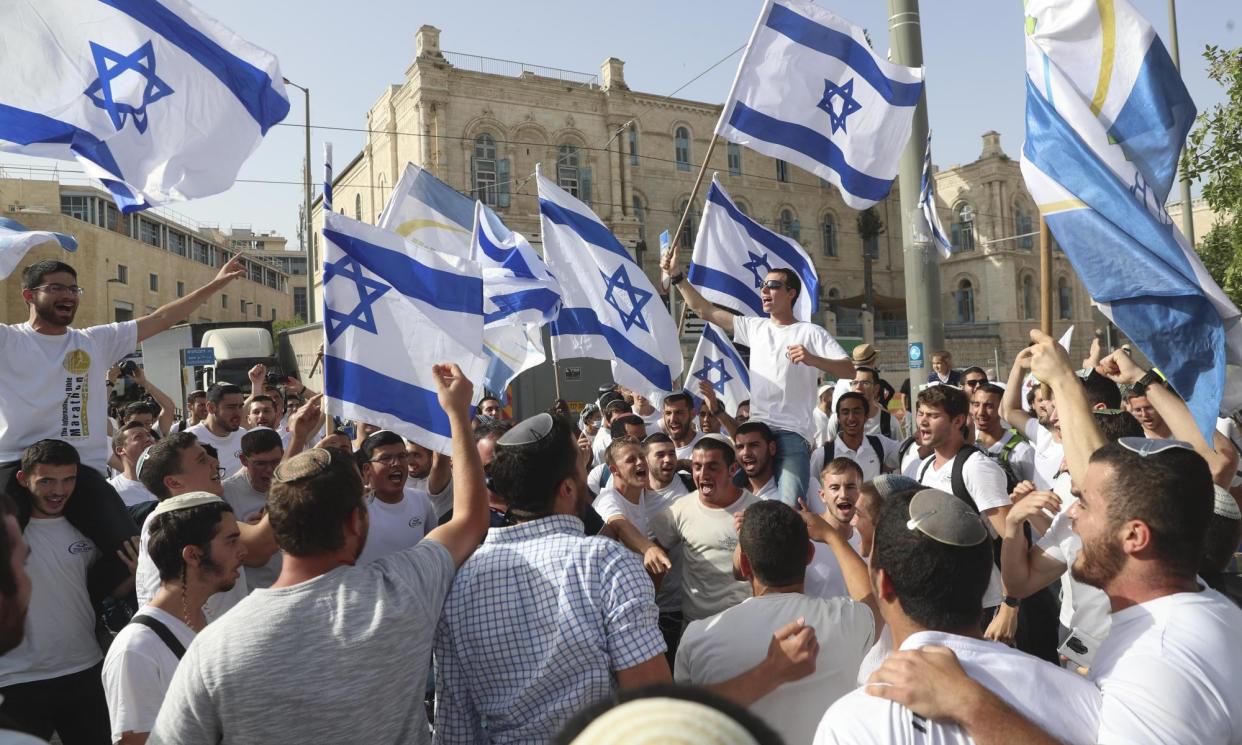Jerusalem braces for Israeli nationalist flag march through Muslim areas

Residents of Jerusalem are bracing for a rightwing flag march through Muslim areas of the Old City, an annual event often accompanied by violence.
The Jerusalem Day parade by thousands of Jewish nationalists celebrates Israel’s capture and occupation of East Jerusalem and its holy sites in the 1967 war, a move that is not internationally recognised.
It is often marred by violent clashes between marchers and Palestinian residents of the Old City, as well as anti-Arab hate speech and vandalism of Palestinian property.
After weeks of unrest in 2021, the prime minister, Benjamin Netanyahu, ordered the parade route for men to be changed at the last minute to avoid the main Muslim thoroughfare, but violence on the day still contributed to the outbreak of an 11-day war between Israel and Hamas.
In 2022, the route was not changed despite warnings from several quarters, including the former US ambassador to Israel Tom Nides, that it could trigger more violence. A larger than usual turnout of about 70,000 people resulted in dozens of injuries in Israeli-Palestinian clashes and altercations with police.
Last year’s parade, which came days after a ceasefire brokered the end of five days of violence between Israel and Hamas, passed without incident. This year, in the wake of the 7 October Hamas attack and the devastating war in Gaza, tensions in the holy city are running high.
Israel’s far-right national security minister, Itamar Ben-Gvir, who is in charge of the police, said last week he would be participating and encouraged supporters to join.
Israeli police said on Tuesday that about 3,000 officers would be deployed in the Old City and surrounding areas on Wednesday afternoon and several major roads would be closed.
“The police urge flag march participants and the public to follow police instructions, avoid any physical or verbal violence, and allow the event to proceed safely while strictly adhering to order and law,” the force said in a statement.
“Any disruptions or acts of violence will be dealt with firmly by the police,” it added.
The parade route does not pass through the Temple Mount, known to Palestinians as al-Haram al-Sharif and home to al-Aqsa mosque – the holiest site in Judaism and third holiest in Islam – which has also been a regular flashpoint for violence.
There was no immediate comment on plans for the parade to go ahead as usual from Palestinian authorities or from the Jordanian Waqf, which administers the Muslim holy sites in the Old City. In past years, Arab officials have been vocal in their opposition to the event.
The streets of Jerusalem’s Old City have been quiet since the outbreak of the war, with few tourists or pilgrims and many shops and restaurants closed.
The Temple Mount area has also been unusually quiet: Israel has restricted access to the site for Palestinian men over 55 and women over 50 since October.
Under a longstanding compromise agreement, Jews are allowed to visit, but not pray at the Temple Mount. In recent years, however, growing numbers of Jewish visitors, sometimes praying or with police escorts, have inflamed longstanding Palestinian fears that Israel plans to annex the area.
In May, Ben-Gvir made his first visit to the Temple Mount since 7 October. His Jewish Power party has long advocated for Jewish sovereignty over the site.


